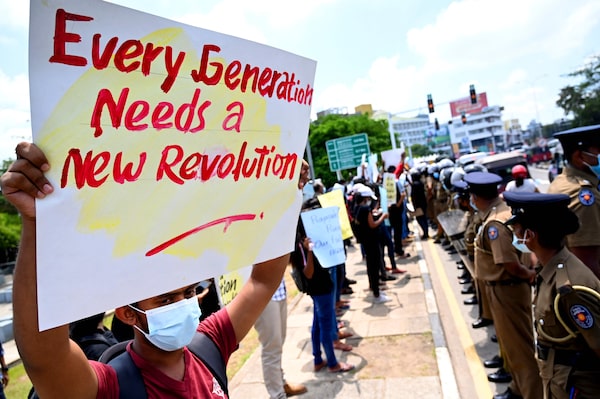
Police stand guard as demonstrators take part in a protest against the surge in prices and shortage of fuel and other essential commodities near the parliament building in Colombo, Sri Lanka, on April 7.ISHARA S. KODIKARA/AFP/Getty Images
When national leaders are rejected by their parliaments, cabinets and militaries amid mass protests in the name of democratic accountability, the outcome usually resonates far and wide.
After all, it was just such a popular and parliamentary uprising in Kyiv eight years ago that rejected Vladimir Putin’s influence and set the Russian president on the path to a bloody invasion that has split the world in two.
So the sight of two countries turning against their leaders, in the same week, for similar reasons, ought to attract more attention – especially since the uprisings seem to have been triggered, in some small part, by the economic effects of the Russian invasion.
It’s tempting to refer to these revolts as a “South Asian Spring.” Not for more than a decade has an entire region experienced a wave of such uprisings, and like the Arab Spring of 2011, these are taking place in countries that should be enjoying a better standard of living, if not for the ruinous decisions of their corrupt leaders.
But there is little of the mood of hope and enthusiasm of a decade ago. And that, I think, is because these crises are rooted in the Cold War-style division of the world that has become more pronounced this year, and the decision to peg their hopes to one side of that divide.
On the surface, both Pakistani Prime Minister Imran Khan and Sri Lankan Prime Minister Mahinda Rajapaksa appear to be victims of the economic effects of the pandemic, including the collapse of travel and soaring import prices, followed by the even more devastating fuel and commodity price shock caused by the Russian invasion. Together, these caused standards of living in their countries to plummet and foreign-currency reserves to vanish.
Yet there are deeper reasons for the revolts. Their countries’ landscapes are dotted with recently built shipping-container ports and airports, nearly vacant, erected with Chinese capital in anticipation of a new globalization coming from the east. Both of these leaders of former British colonies hoped to tie their fortunes to a new centre of the world economy, and borrowed vast sums from Beijing, often at high rates, in anticipation of their place along the New Silk Road. That road remains empty, and the debts have come due.
Mr. Rajapaksa’s fall has been the most precipitous. He and his family, including his brother Gotabaya, the current president, have ruled Sri Lanka, but for a four-year break, since 2005, and have been all but abandoned by Western lenders for their lavish corruption.
I wrote recently about his catastrophic decision last year to force his entire country’s agricultural system immediately into organic techniques, resulting in failed harvests of rice – the main food source – and tea, which is among the country’s largest sources of foreign capital other than tourism, itself killed by the pandemic. This was part of a larger, misguided effort to ban imports, which drove up living costs sharply.
The disappearance of foreign currency meant Sri Lankans were essentially missing meals to pay off the Chinese debts. The results of those debts are well known to Sri Lankans: Among many white elephants are Rajapaksa International Airport, known since its 2013 construction as “the world’s emptiest international airport” and used mainly to store rice, a short drive from an equally unused container port, all ordered built with Chinese loans by the ruling family.
As a consequence, this week Mr. Rajapaksa’s entire cabinet resigned, and his replacement finance minister quit after less than 24 hours, as infuriated Sri Lankans filled the streets of Colombo.
By contrast, Pakistan’s cricket-star Prime Minister, Mr. Khan, faced a revolt from his parliament’s opposition majority, and tried to dodge a confidence vote by closing parliament and calling an election (a move the courts deemed unconstitutional) as protesters massed. It’s widely reported that he has been abandoned by the military and intelligence services that have backed his rule since 2018.
His country, much poorer than Sri Lanka, has faced even more damaging shocks to its livelihood under his rule. Turning sharply against the West and overtly backing Russia and China, Mr. Khan made his country even more dependent on Chinese loans, many at very high rates. Once again, the promised trade revenues never materialized, and his country is also dotted with vacant “New Silk Road” infrastructure. Earlier this year, he restructured tens of billions in Chinese debt, at terms that will make life even more difficult for Pakistanis.
This is not the first time South Asian leaders have earned the wrath of their publics by making themselves far too dependent on an overseas superpower. And, given the increasingly sharp divide between the world’s power blocs, it is not likely to be the last.
Keep your Opinions sharp and informed. Get the Opinion newsletter. Sign up today.
 Doug Saunders
Doug Saunders